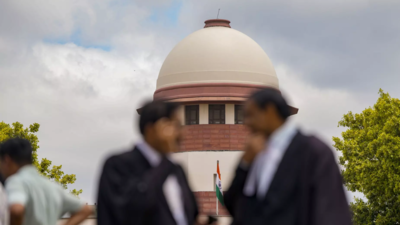NEW DELHI: Observing that absence of adequate washroom facilities in court premises undermines equality and poses a barrier to the fair administration of justice, Supreme Court has directed states and all high courts to ensure the construction of separate toilet facilities for males, females, transgender and persons with disability in all court premises and tribunals across the country.
Saif Ali Khan Health Update
A bench of J B Pardiwala and R Mahadevan directed HCs to form a committee headed by its judge and comprising the chief secretary, the PWD secretary and the finance secretary of the state, a representative of the Bar Association to undertake the task. “In our opinion, toilets / washrooms / restrooms are not merely a matter of convenience, but a basic necessity which is a facet of human rights. Access to proper sanitation is recognised as a fundamental right under Article 21 of the Constitution, which guarantees the right to life and personal liberty. This right inherently includes ensuring a safe and hygienic environment for all individuals. …. Access to justice includes the creation of a pleasant and humanly atmosphere for all the stakeholders in the dispensation of justice. The litigants for fear of sitting in courts for long hours without access to basic amenities should not be forced to refrain from exercising their legal rights,” the top court bench said.
The bench expressed deep concern over lack of infrastructure in district courts, particularly, in rural areas, with no proper washroom facilities. “This not only violates the rights of those directly affected but also tarnishes the reputation of the judicial system, which should serve as a model of fairness, dignity, and justice. The failure to provide adequate washroom facilities is not just a logistical issue, but it reflects a deeper flaw in the justice system. The sorry state of affairs indicates the harsh reality that the judicial system has not entirely fulfilled its constitutional obligation to provide a safe, dignified, and equal environment for all those seeking justice,”it said.
It said that courts should not be places where basic needs, such as sanitation, are overlooked and neglected. “The absence of adequate washroom facilities undermines equality and poses a barrier to the fair administration of justice. Therefore, all High Courts must take swift and effective action to address this issue. Immediate steps are needed to ensure that all judicial premises, especially those lacking proper facilities, are equipped with accessible washroom facilities for the judges, litigants, advocates, and staff. It is re-emphasised that this is not just a matter of convenience, but is about basic rights and human dignity. Failing to act promptly would compromise the very purpose and essence of the judiciary’s role in our society,”it said.




